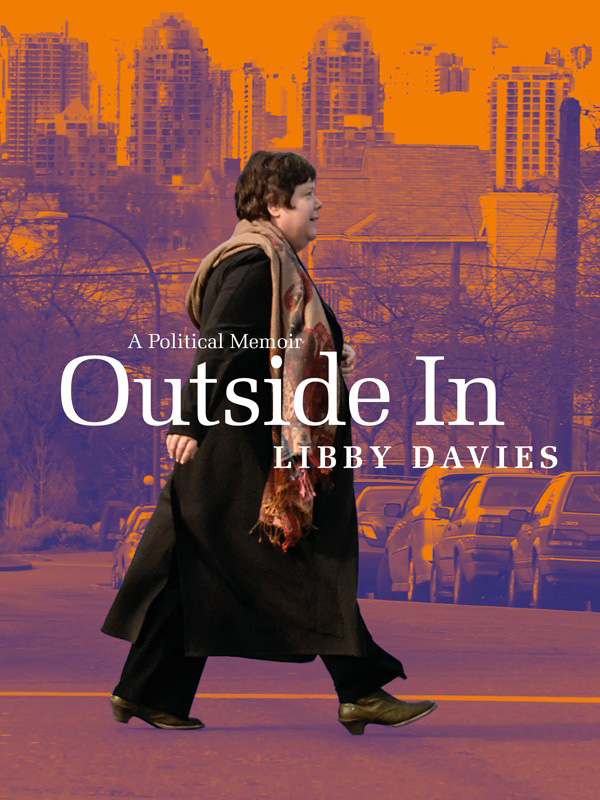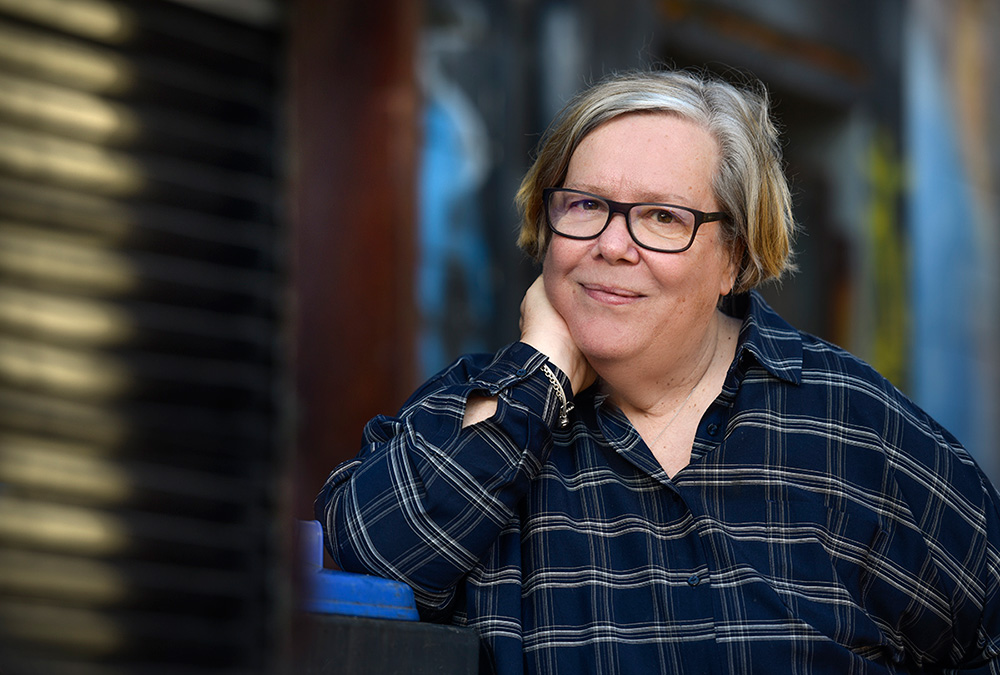[Editor’s note: In 2015, Libby Davies made the long trek home from Ottawa’s House of Commons to Vancouver for the final time. For 18 years the NDP MP represented Vancouver East, where she’d spent decades at the centre of some of the most important activism the city has seen: fighting for the rights of low-income residents to safe and affordable housing; the rights of sex workers to protected and dignified workplaces; and the rights of drug users’ access to clean drugs, among others.
In her hopeful new memoir 'Outside In,' Davies recounts those early days with her partner Bruce Eriksen, bringing to life a Vancouver pumped full of activist adrenaline and the dream of making the city a decent home for all. Davies also recounts her years as a member of Canada’s Opposition, which showed her that progressive policies were still possible when people worked collaboratively across parties, together, in good faith. In 2001, Davies was the first female Canadian MP to reveal publicly that she was in a same-sex partnership. Today, we’re pleased to share an excerpt from 'Outside In,' about the steps towards Canada legalizing same-sex marriage, which finally happened in 2005.]
In February 2005, the Liberal minority government introduced Bill C-38 to legalize same-sex marriage in Canada. Previous debates on the issue had been intense and fractious, with the Conservative party showing its muscle for so-called traditional values.
It was an experience where the personal became political and the political, personal.
Conservative MP Jason Kenney from Calgary resorted to bizarre and ridiculous arguments to bolster his position against same-sex marriage. He asserted, “The fact is homosexuals aren’t banned from marrying under Canadian law. Marriage is open to everyone, as long as they’re a man and a woman.” He elaborated, “It doesn’t say you can’t marry if you’re a homosexual. The fact is that homosexuals have been married and do marry.”
He then proceeded to the proof of his great analysis: Svend Robinson had once been married to a woman and “Libby Davies had been married to a man.”
A Canadian Press story at the time also cited the latest poll on same-sex marriage, showing 42 per cent of Canadians in favour and 40 per cent opposed. The Conservatives were doing their best to drive division and crassly cater to conservative ethnic and religious views — indeed, Kenney’s comments were made before the Punjabi Press Club in Brampton, Ontario. This strategy of exploiting faith differences to political advantage to bolster a right-wing agenda has been used many times. Kenney was good at it. He had a special role in the Conservative caucus to form relationships with communities of various ethnicities and religions in order to play up concerns about things, like same-sex marriage, that could be difficult for a particular segment of a community to understand and accept.
At the earliest opportunity, I sought Kenney out. I thought about rising in the House to demand that he publicly apologize, but decided I didn’t want to further illuminate his shameful escapade. On the opposition side of the House, near the back row, where the heavy gold-coloured curtains hang and MPs enter and exit the chamber, I caught sight of him. At that moment I felt a rare, and deeply personal and intense, dislike of the man and his divisive politics. Unfortunately we would see his divisive way of working again, when he became a minister in the Conservative government of 2007. That day I spoke to him privately. I told him that, first, his facts were wrong. I had never been married. I had lived common-law with my partner, Bruce, for 24 years. I expressed my deep offence at his twisted comments about same-sex marriage, which used people’s personal lives to score what he thought was some brilliant political point. I asked him to apologize. He only muttered about fair public debate. It felt pointless to talk further with such a person and I left.
Years later, in 2017, with Kenney now active in provincial politics in Alberta, Michael Connolly, a young NDP provincial representative in Alberta, posted a copy of the 2005 newspaper article about Kenney’s ridiculous comments. He shared how as a young person, he had grown up in Kenney’s Calgary riding and felt targeted and excluded by the MP’s stance. It made me realize how far we had progressed for equality rights, but also how deeply personal and hurtful these issues can be for us all.

There were many times when the debate on same-sex marriage felt personal, though I wasn’t myself into the idea of getting married. The debates in the House became so nasty and personal that Bill Siksay, NDP MP for Burnaby-Douglas, Bloc Québécois MP Réal Ménard, and I wrote a joint letter to all four party leaders to make it clear that it was not only a political question of equal marriage under the law, it was also a deeply personal issue to thousands of LGBTQ+ Canadians and ourselves as out parliamentarians. Bill crafted the letter beautifully, making it clear how painful it was to listen to debate that was derogatory, hurtful and homophobic. We delivered the jointly signed letter to the party leaders and hoped it would help improve the tone of debate in the House.
At its final vote in the House of Commons, Paul Martin had made it clear that the Liberal caucus were free to vote without the party whip over them. Thirty-two Liberal MPs voted against the bill. Astonishingly Jack Layton was publicly criticized for saying that in his NDP caucus there was no free vote when it came to upholding human rights and equality. I felt particularly proud to be a New Democrat that day.
The final vote on Bill C-38 happened June 28, 2005, on a hot Ottawa summer night. Many people had gathered outside the main door to Parliament and Jack came out, with a number of us from the caucus, to greet them and give a cheer for a historic day. I remember an orange tinge to the sky (I don’t think it was just my euphoria about NDP colours on such a day) and a humidity so smothering it felt like you could touch it. People had waited for hours in the heat, but still you could feel the energy and elation in the heavy air as they embraced each other with love and victory. It was a moment to reflect that the incredible work of dedicated activists over many years, from all walks of life — including parliamentarians, in particular my colleague Svend Robinson, lawyers, and the courts — had turned a page for equality and against hatred.
There would be other battles for equality on many fronts ahead, but that night it was time to celebrate that something good and important had been achieved. The struggle for equal marriage in Canada is a wonderful example of how movements for social change and elected representatives can work together to achieve progress on human rights and equality.
'Outside In' will have its Vancouver launch on May 22 at 7 p.m. at the SFU Goldcorp Centre for the Arts (149 W. Hastings St.) More details here. ![]()
Read more: Rights + Justice, Politics, Gender + Sexuality















Tyee Commenting Guidelines
Comments that violate guidelines risk being deleted, and violations may result in a temporary or permanent user ban. Maintain the spirit of good conversation to stay in the discussion.
*Please note The Tyee is not a forum for spreading misinformation about COVID-19, denying its existence or minimizing its risk to public health.
Do:
Do not: